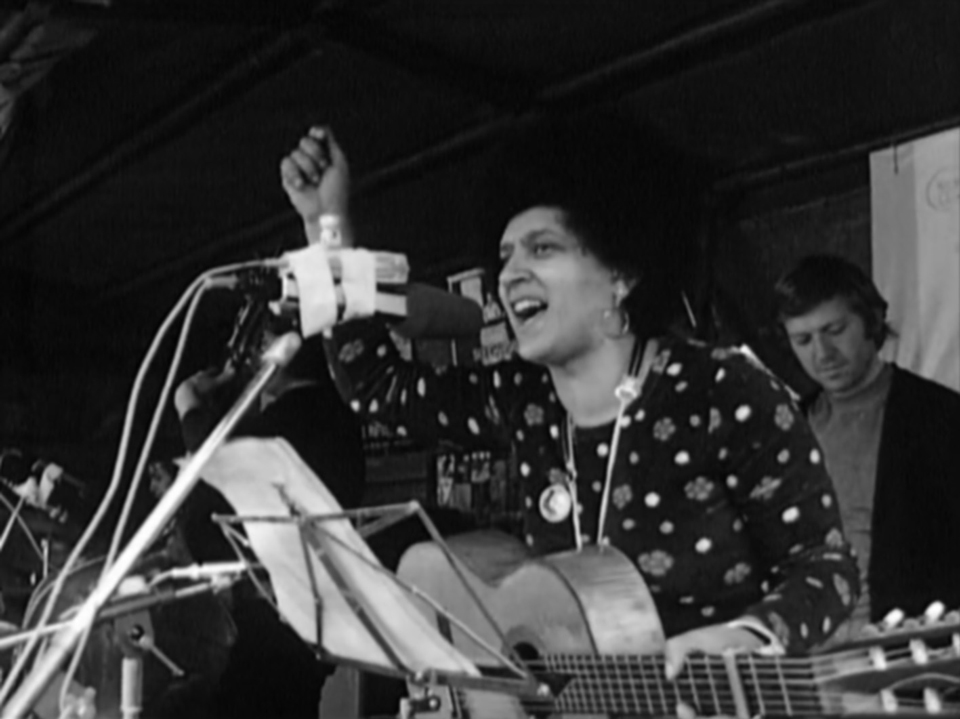IND 1982 | Directors, Production: Yugantar | Camera: Navroze Contractor | Sound: G.V. Somashekhar | b/w | DCP | 25 min | marathi OV with english SUB | Arsenal – Institut für Film und Videokunst
Tambaku Chaakila Oob Ali documents, re-enacts, and takes forward one of the largest movements of unorganized labor of its time and context, which sparked unionizing processes across India throughout the 1980s. In the spirit of mobilizing for the leftist labor and the women’s movements the Yugantar collective spent four months with female tobacco factory workers in Nipani, Karnataka in India, listening to their accounts of exploitative working conditions, discussing strategies for unionizing and steps to broaden solidarities for strike actions, and filming previously unseen circumstances inside the factories. The team followed the workers’ leads as to what, where, and how their actions should be recorded, and developed a loose script through the workers’ narratives. Yugantar’s commitment to the complexity of political friendships and how to ‘stand with’ provoked a then pioneering collaborative filmmaking practice embodied in large scale reenactments, a voice-over as pluriverse testimony, and the production of the first screen presence of working-class women ‘speaking to power’. A powerful example of a feminist third cinema, now available to be revisited and to spread its film/political energies. (Nicole Wolf, Forum Expanded, 2019)

| Acronyms | |
|---|---|
| amer. | American English |
| b/w | Black and white |
| OV | Original version |
| SUB | Subtitles |
| +SUB | electronic live subtitling (below the image) |
| INT | Intertitles |
| Countries | |
|---|---|
| AT | Austria |
| FRG | Federal Republic of Germany (historic) |
| BLR | Belarus |
| DE | Germany |
| CAN | Canada |
| GDR | German Democratic Republic (historic) |
| EGY | Egypt |
| FR | France |
| GB | Great Britain |
| URY | Uruguay |
| BRA | Brasil |
| SWE | Sweden |
| UKR | Ukraine |
| PL | Poland |
| IDN | Indonesia |
| PRT | Portugal |
| HRV | Croatia |
| ECU | Ecuador |
| HUN | Hungary |
| AUS | Australia |
| IT | Italy |
| MEX | Mexico |
| IND | India |
FRG 1975/76 | Directors: Edith Marcello (former Schmidt), David Wittenberg | b/w | 16mm | 67 min | german OV | DFF – Deutsches Filminstitut & Filmmuseum
On 10 March 1975, industrial action history was made in the small Westphalian town of Erwitte: Employees of the local Seibel & Söhne cement factory occupied the plant in the face of threatened dismissals. It was one of the first company occupations in West German history. The occupation led to an avalanche of lawsuits in the months and years that followed, as civil property rights were challenged. Edith Marcello and David Wittenberg documented this labour struggle in close collaboration with the workers and their families; the conflict initiated the strong politicisation of the cement workers' wives, who began to question their traditional roles. Marcello/Wittenberg also arranged for the film and their previous two strike films DER KAMPF DER LIP-ARBEITER and PIERBURG: IHR KAMPF IST UNSER KAMPF to be distributed by Mai-Film, in order to promote publicity and solidarity. In late 1977, they wrote to their friends in Erwitte: "[...] Let us hope, without deluding ourselves, that, together with many others, we will find better solutions to the difficult problems we face, and that we will find them in conditions that truly deserve to be called humane and free." (Gaby Babić, 2023)


| Acronyms | |
|---|---|
| amer. | American English |
| b/w | Black and white |
| OV | Original version |
| SUB | Subtitles |
| +SUB | electronic live subtitling (below the image) |
| INT | Intertitles |
| Countries | |
|---|---|
| AT | Austria |
| FRG | Federal Republic of Germany (historic) |
| BLR | Belarus |
| DE | Germany |
| CAN | Canada |
| GDR | German Democratic Republic (historic) |
| EGY | Egypt |
| FR | France |
| GB | Great Britain |
| URY | Uruguay |
| BRA | Brasil |
| SWE | Sweden |
| UKR | Ukraine |
| PL | Poland |
| IDN | Indonesia |
| PRT | Portugal |
| HRV | Croatia |
| ECU | Ecuador |
| HUN | Hungary |
| AUS | Australia |
| IT | Italy |
| MEX | Mexico |
| IND | India |






